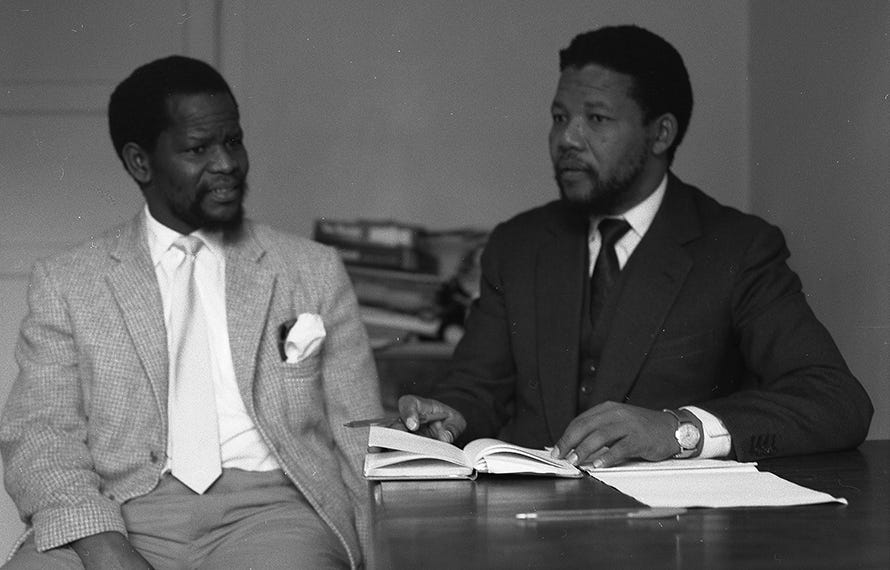Revisiting the Arrest of Nelson Mandela
Unanswered Questions
Nelson Mandela's release from prison on February 11, 1990, after more than 27 years behind bars, was celebrated around the world. His arrest, on August 5, 1962, was hardly noted until he went on trial later that year. In 1986, at the height of the global anti-apartheid movement, the Johannesburg Star reported that the police had been tipped off to his location by an American diplomat at the U.S. consulate in Durban who was also a CIA agent.
In 1986 Donald Rickard, then 88 years old, told a journalist that he was that agent and that he had no regrets.
“Mandela was completely under the control of the Soviet Union,” Rickard said. "We were teetering on the brink here and it had to be stopped, which meant Mandela had to be stopped. And I put a stop to it.”
Oliver Tambo and Nelson Mandela. Credit: South Africa History Online
Richard Stengel, who served as the ghostwriter for Mandela's autobiography Long Walk to Freedom, retold this story in a Time magazine article released in February to publicize his new 10-part podcast series based on his interviews for that book. Stengel also cited a report in the Atlanta Journal-Constitution that CIA headquarters official Fred Engel had bragged to a colleague at the time that "we have turned Mandela over to the South African security branch."
The basic facts are not in doubt. Donald Rickard did it, and his action was approved by his superiors at CIA headquarters. And it was in line with U.S. policy that prioritized Cold War competition over freedom in South Africa until the mid-1980s. But the account also raises questions as to who knew and at what level the action was approved.
I might have left those questions for another time, but for two reasons.
First, I was intrigued by the sharp contrast with the other notable CIA intervention of that period of the Cold War era, namely the assassination of Patrice Lumumba in February 1961. There is abundant research available covering episodes such as Lumumba's meeting at the State Department at which Under-Secretary of State Douglas Dillon concluded that he must be eliminated. Historians have also explored the complex sequence of actions by Belgian, U.S., and Congolese conspirators who carried out the deed.
Second, by sheer coincidence, my wife and I stayed last September at an Airbnb in rural New Hampshire that turned out to be owned by the son of the U.S. diplomat who headed the consulate in Durban in 1962. The son was a teenager and knew both vice-consuls at the time. But neither his father nor the other vice-consul was then aware that Rickard worked for the CIA.
For me, that raised the question about who in Washington knew. In the case of Lumumba, the decision was taken after he met with State Department officials on July 27, 1960. However, the name Nelson Mandela does not appear at all in published State Department documentation on the years 1961-1963. In the Kennedy administration, which took office in January 1961, the Under-Secretary of State for Africa was G. Mennen Williams. Williams was previously the Governor of Michigan, known as a liberal, who came under criticism for his advocacy of "Africa for the Africans." Williams held that position until 1966 and was a strong critic of South Africa.
It seems improbable that the CIA would have consulted anyone at the State Department or White House about the decision to help South African security forces arrest Nelson Mandela. It would be interesting to know, however, whether they were completely in the dark about U.S. involvement. Would a closer examination of State Department records for 1962 show that Williams or anyone else at the State Department was even aware of the arrest of Nelson Mandela?
If any of my readers knows the answer to that question, or is in a position to find out, I would be very interested to hear from them.
AfricaFocus Notes is a reader-supported publication. To receive all new posts, consider becoming a free subscriber and sharing this with friends as colleagues. Paid subscriptions are also welcome as support for this publication. However, no post will be hidden behind a paywall.


